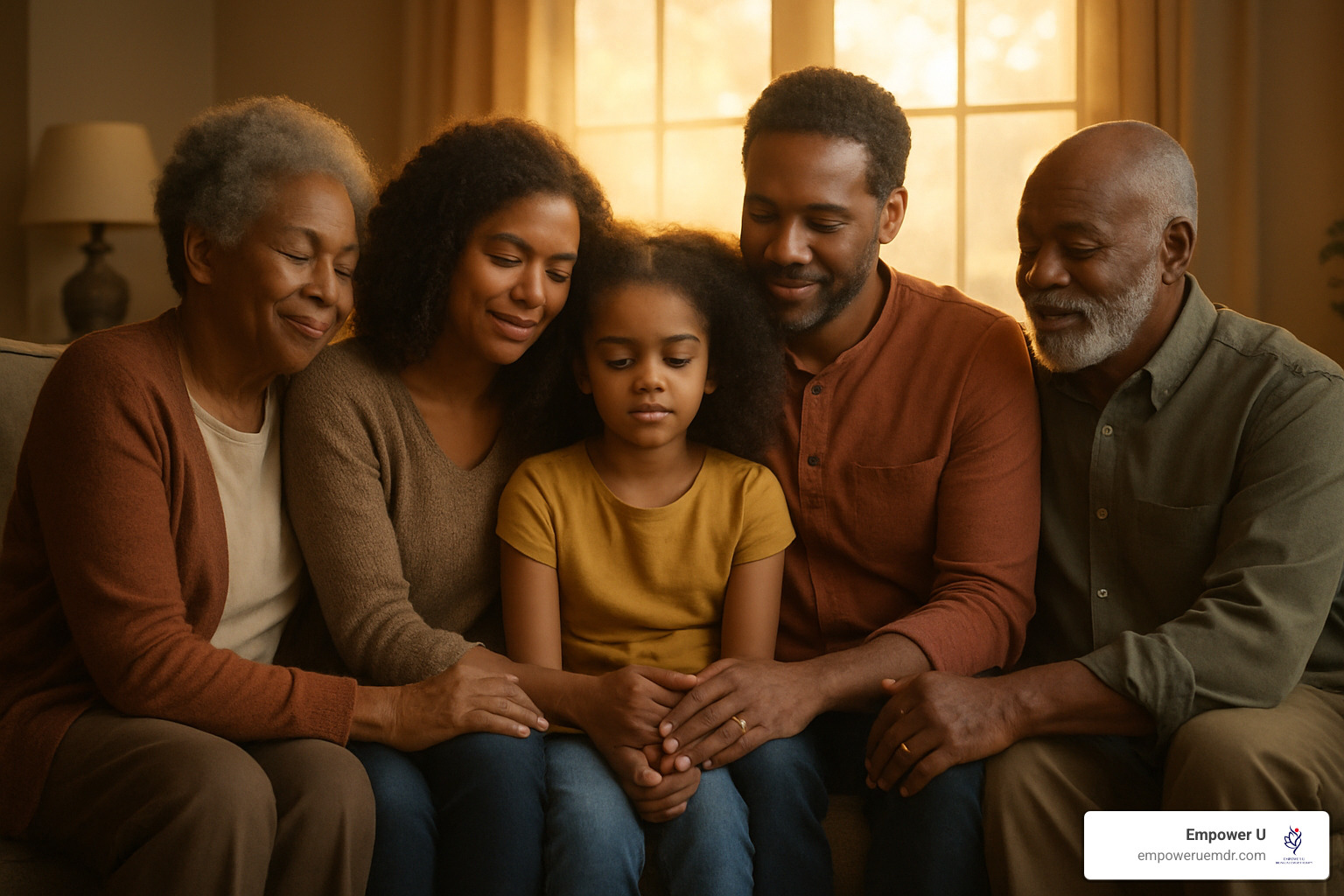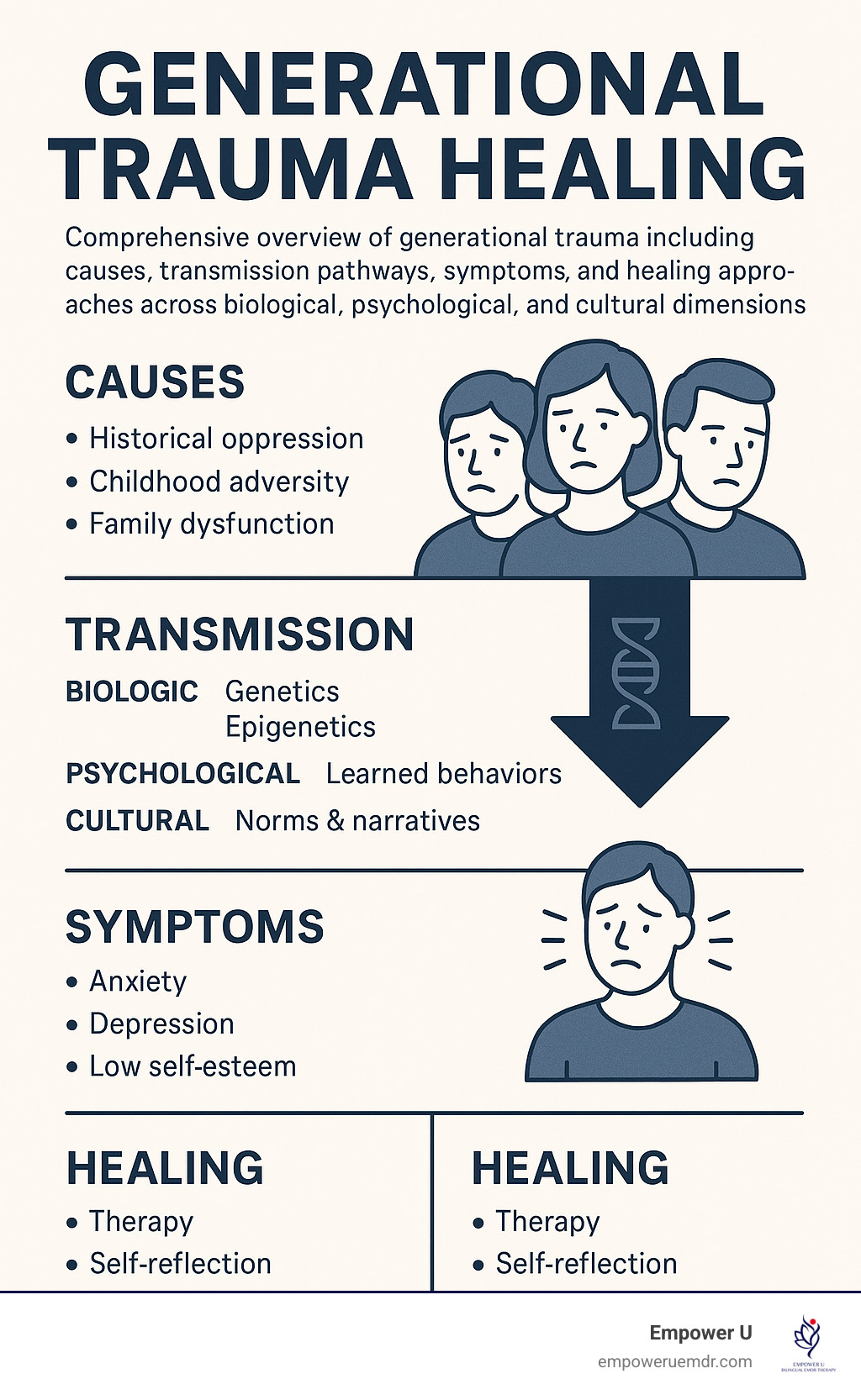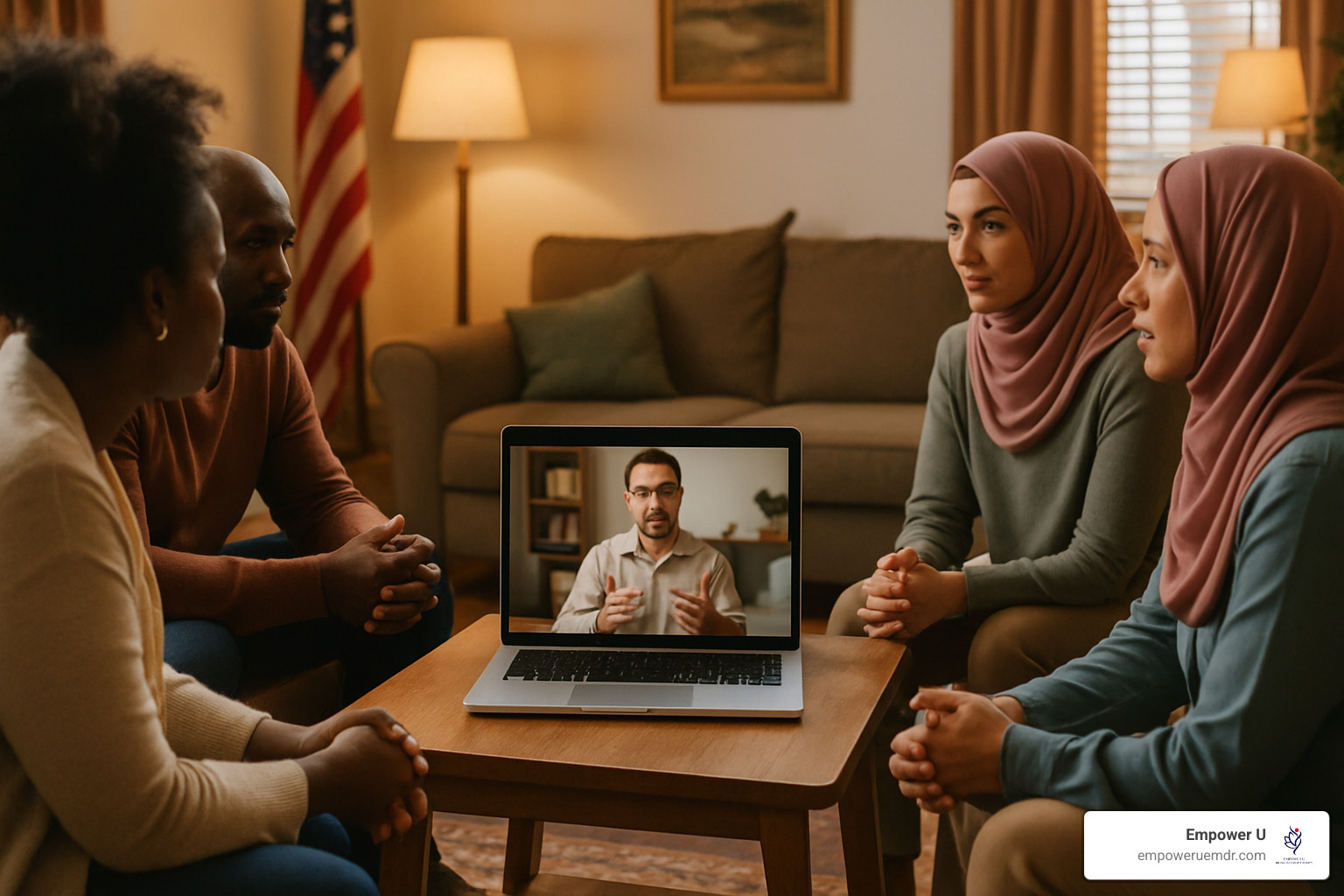Breaking Generational Trauma: A Bilingual Approach to Healing Inherited Patterns

Understanding the Weight of Generational Trauma
Growing up between two cultures means carrying stories that aren't always your own. As an adult child of immigrants, you might recognize the familiar weight of expectations, the quiet guilt when you choose differently than your parents hoped, or the exhausting cycle of trying to honor your heritage while creating your own path forward.
At Empower U, I understand this struggle intimately. My own journey from engineering to therapy began when I realized I was living someone else's definition of success while my authentic self remained hidden. As a bicultural immigrant raising American children in a biracial marriage, I've learned that healing generational trauma isn't about abandoning your roots—it's about choosing which seeds you want to plant for future generations.
Generational trauma healing is the process of identifying, understanding, and transforming emotional wounds that travel through family lines. When overwhelming traumatic experiences like immigration, displacement, poverty, or systemic oppression exceed a family's capacity to process what happened, survival strategies become family rules. These unspoken patterns shape how we see ourselves, our relationships, and our place in the world, often creating mental health challenges that persist across multiple generations.
The Invisible Inheritance: How Intergenerational Trauma Develops
Generational trauma often hides behind phrases like "that's just how our family is" or "you're too sensitive." Unlike individual trauma with a clear before-and-after, inherited trauma feels like the air you grew up breathing—hard to see because it's always been there. This intergenerational trauma can profoundly impact mental health, creating patterns that affect entire families and communities.
Research first identified this phenomenon in Holocaust survivors' children who displayed anxiety and hypervigilance despite never experiencing the original traumatic events themselves. Scientists now understand that trauma can be transmitted through multiple pathways, creating lasting effects on mental health and well being across one generation to the next.
Behavioral modeling: Children absorb how parents handle fear, express emotion, or navigate conflict. If your parents learned that feelings were dangerous or that speaking up meant betrayal, you might have inherited those same protective coping mechanisms. These behaviors, while protective in their original context, can become limiting when passed down to future generations.
Family narratives: The stories families tell—or don't tell—teach what's safe to feel and say. Silence around certain topics can be just as powerful as spoken warnings, creating invisible rules that govern family relationships and individual mental health.
Intergenerational transmission: Stress and trauma can leave chemical markers on DNA that influence how future generations respond to perceived threats. Your body might react to situations as if you're in danger, even when you're safe, demonstrating how generational trauma can manifest in physical symptoms and stress responses.

Recognizing Generational Trauma Patterns in Your Own Life
As adult children of immigrants, certain patterns of generational trauma might feel especially familiar, often manifesting as mental health issues that seem disproportionate to current circumstances:
The responsibility trap: Feeling responsible for your parents' happiness, sacrificing your own needs to meet family expectations, or carrying guilt when you can't fix their struggles. This pattern often develops when children experience early responsibility for family well being.
Cultural limbo: Questioning where you belong, feeling "too American" for your family and "too foreign" for mainstream culture, or struggling to integrate different parts of your cultural background and identity.
The perfectionism burden: Believing you must achieve more to prove your family's sacrifices were worth it, or feeling like any mistake reflects poorly on your entire lineage. This form of generational trauma can create chronic stress and mental health challenges.
Emotional shutdown: Learning that certain feelings are selfish, dangerous, or inappropriate, leading to difficulty expressing needs or setting boundaries. When childhood trauma includes messages that emotions are unsafe, this pattern becomes deeply ingrained.
Hypervigilance: Constantly scanning for signs of disapproval, rejection, or conflict, making it hard to relax or trust that you're truly safe. This stress response, while protective during traumatic experiences, can persist long after the original threat has passed.
These patterns often develop as protective responses to real challenges your family members faced. The problem isn't that they existed—it's that they may no longer serve you in your current life, and breaking generational trauma requires conscious effort to change these inherited coping mechanisms.
The Science Behind Breaking Generational Trauma
Understanding how generational trauma affects mental health helps explain why healing can feel so challenging. When previous generations experience trauma, their stress responses become encoded not just in behavior but potentially in their biology. Research on intergenerational trauma shows that these effects can influence everything from anxiety levels to physical well being across multiple generations.
However, the same mechanisms that transmit trauma can also transmit healing. When you develop healthier coping mechanisms and improve your mental health, you're not just changing your own life—you're potentially altering what future generations inherit. This is why addressing generational trauma through therapy can have such profound impacts on entire families and communities.
Children learn emotional regulation, stress management, and relationship skills by watching how their parents handle challenges. When you model healthy responses to stress, express feelings appropriately, and maintain strong mental health, you're teaching these skills to the next generation. This positive intergenerational transmission can help break cycles of trauma that may have persisted for generations.
A Personalized Approach to Healing Generational Trauma
Healing generational trauma requires more than just understanding what happened. It involves reprocessing old wounds, developing new coping strategies, and learning to honor your heritage while creating space for your authentic self to emerge. In my practice, I work with adult children of immigrants to address both individual mental health needs and broader patterns of intergenerational trauma.
I organize healing around five essential pillars that address both immediate mental health concerns and longer-term generational healing:
Safety: Creating a Foundation for Mental Health and Well Being
Before we can explore deeper patterns of generational trauma, we need to ensure your nervous system feels safe in the present moment. This involves developing grounding skills, establishing stable routines, and building supportive relationships that calm your stress response and improve overall mental health.
I often teach clients simple techniques like box breathing or progressive muscle relaxation—tools you can use when family gatherings trigger old anxiety or when perfectionist thoughts threaten to overwhelm you. These self care practices help manage stress in the moment while building long-term resilience.
Awareness: Recognizing When Generational Trauma Patterns Take Control
Healing begins with recognition. Through mindful observation, you start noticing when inherited patterns are running the show versus when you're making conscious choices aligned with your values. This awareness is crucial for breaking generational trauma cycles that may have influenced your family for multiple generations.
I might ask questions like: "When you feel that familiar guilt, whose voice is speaking? Is this your wisdom or an inherited fear from previous generations?" This gentle inquiry helps you differentiate between protective strategies that served your family members and the authentic responses that serve you now.
Connection: Repairing Relationships Affected by Generational Trauma
Many adult children of immigrants struggle with family relationships—either becoming overly responsible for others' emotions or maintaining walls that keep people at a safe distance. Generational trauma often creates challenges in forming healthy attachments and maintaining strong community connections.
Through therapy, we work on developing authentic communication skills and practicing vulnerability in measured doses. This might involve learning to express disagreement without fear of abandonment, or discovering that you can love your parents while choosing different values for your own life. Building these skills helps heal not just individual mental health issues but also strengthens family relationships for future generations.
Empowerment: Reclaiming Your Voice from Generational Trauma
As patterns become clear, we practice new responses that support better mental health and break cycles of intergenerational trauma. This could mean rehearsing how to set boundaries with family members, exploring career choices that align with your interests rather than expectations, or learning to validate your own emotions instead of dismissing them.
I help clients develop what I call "cultural bilingualism"—the ability to honor family traditions while making space for personal growth. This approach respects your cultural background while supporting your individual mental health and well being.
Resilience: Integrating Changes Into Daily Life to Support Future Generations
Real healing from generational trauma happens in everyday moments. We work on integrating new skills until they become second nature, building resilience that can weather family conflicts, cultural pressure, or unexpected life challenges. This resilience becomes part of what you pass down to future generations, helping break cycles of trauma.

Evidence-Based Therapeutic Approaches for Generational Trauma
My approach combines evidence-based therapies with deep cultural understanding, recognizing that healing generational trauma requires both clinical expertise and culturally sensitive support:
EMDR (Eye Movement Desensitization and Reprocessing): This therapy helps reprocess distressing memories and the limiting beliefs they created. When a client tells me they feel "not good enough" despite obvious achievements, we often trace this belief back to specific traumatic events and use EMDR to reduce their emotional charge. EMDR is particularly effective for addressing childhood trauma that may underlie generational patterns.
Internal Family Systems (IFS): This approach helps identify different "parts" of yourself—like the part that tries to be perfect or the part that stays quiet to keep peace. We learn to appreciate these protective strategies while helping them relax when they're no longer needed, supporting better mental health and emotional regulation.
Cognitive Behavioral Therapy (CBT): CBT provides practical tools for challenging inherited beliefs and developing healthier thought patterns. It's particularly helpful for addressing anxiety and depression that may have cultural components or stem from intergenerational trauma.
Dialectical Behavior Therapy (DBT): DBT skills help regulate intense emotions and improve relationships. For clients caught between cultural expectations and personal desires, these tools provide a middle path that honors both heritage and individual mental health needs.
Narrative Therapy: This approach helps you examine the stories you've inherited about yourself and your family, then author new chapters that reflect your true values and aspirations. It's particularly powerful for addressing the identity conflicts common in generational trauma.
What Healing Generational Trauma Looks Like in Practice
During our first session, I invite you to share your story at your own pace. I listen for patterns, cultural background, and the hopes you carry. We're not looking for what's "wrong" with you—we're looking for meaning, connections, and ways to reclaim your voice while improving your overall mental health.
As we work together on healing generational trauma, you might notice:
- Attending family gatherings without days of anticipatory anxiety or stress
- Disagreeing with parents while still feeling worthy of love and connection
- Making career or relationship choices based on your values rather than fear
- Physical symptoms like headaches or insomnia beginning to ease as mental health improves
- Greater comfort expressing emotions and setting boundaries with family members
- Improved ability to manage stress in healthy ways
- Stronger sense of cultural identity that doesn't conflict with personal growth
These changes often inspire curiosity in other family members, creating opportunities for broader healing within your community and potentially affecting multiple generations.
Supporting Family Members Affected by Generational Trauma
Sometimes, your healing journey inspires curiosity or concern in family members who may also carry the effects of intergenerational trauma. Here's how to navigate these conversations with compassion while maintaining your own mental health:
Honor their protective intentions: Your family's patterns likely developed as responses to real threats or traumatic experiences. Acknowledge their strength while explaining your need to adapt these strategies for your current life.
Share gradually: You don't need to explain every therapeutic insight. Instead, model the changes you want to see—expressing emotions calmly, setting boundaries kindly, or making choices confidently. This helps other family members see that healing is possible.
Stay connected to your values: Healing generational trauma doesn't require cutting ties with family or culture. It means choosing which traditions to maintain and which patterns to transform for better mental health.
Be patient with their process: Family members may need time to understand your changes, especially if they're dealing with their own unprocessed trauma. Continue focusing on your own growth while leaving space for them to evolve at their own pace.
Building Resilience and Self Care for Future Generations
When you heal generational trauma, you're not just changing your own mental health—you're creating a new inheritance for future generations. Children learn resilience by watching how you handle stress, express emotions, and navigate conflicts. The self care practices you develop become models for how the next generation can maintain their own mental health and well being.
Daily practices that support ongoing healing from generational trauma include:
Mindfulness and stress management: Taking brief pauses throughout the day to check in with your body and emotions, helping you manage stress before it becomes overwhelming
Boundary practice: Gently but firmly saying no to requests that don't align with your values, demonstrating healthy relationship skills to children and other family members
Cultural celebration: Choosing which aspects of your heritage to embrace and share, creating positive associations with your cultural background
Emotional expression: Allowing yourself to feel the full spectrum of human emotions without judgment, modeling emotional health for future generations
Self care routines: Prioritizing activities that support your mental health and physical well being, showing children that taking care of yourself is important
Community connection: Building relationships that support your healing journey while maintaining connections to your cultural community
These practices help ensure that what you pass down to future generations includes tools for resilience rather than patterns of trauma.
Recognizing When Professional Support Can Help
Many adult children of immigrants initially resist seeking professional help for generational trauma, feeling that they should handle family issues privately. However, working with a trauma therapist who understands your cultural background can make a significant difference in your healing journey and overall mental health.
You might be ready for support if:
- Anxiety or guilt feels larger than your current circumstances warrant
- You find yourself repeating family patterns you swore you'd change
- Family relationships feel either suffocating or distant
- You struggle to make decisions without overwhelming guilt or fear
- Physical symptoms persist despite medical clearance
- Stress management feels impossible despite your best efforts
- Mental health issues are affecting your work or relationships
- You want to break cycles of trauma before starting your own family
In my practice, clients often express relief at not having to translate their cultural experience while explaining their pain. I bring my own bicultural experience to each session, understanding the unique challenges of navigating between worlds. Spanish is my first language, and I know what it's like to question where you belong or feel torn between honoring family and pursuing personal dreams.

Building Community Support for Generational Trauma Healing
Healing from generational trauma happens not just in individual therapy but within supportive communities that understand your experience. Building connections with others who share similar cultural backgrounds or have faced comparable challenges can provide additional resources for healing and ongoing mental health support.
Community support might include:
Cultural organizations: Groups that celebrate your heritage while supporting individual growth and mental health
Support groups: Spaces where you can share experiences with others healing from similar patterns of intergenerational trauma
Educational workshops: Learning opportunities that help you understand trauma, mental health, and healing in culturally relevant contexts
Peer networks: Connections with other adult children of immigrants who are also working to balance family loyalty with personal growth
Mentorship relationships: Learning from others who have successfully navigated similar challenges while maintaining strong family relationships
These community connections complement individual therapy by providing ongoing support, reducing isolation, and creating examples of how healing from generational trauma is possible while maintaining cultural connections.
The Ripple Effects: How Your Healing Impacts Multiple Generations
One of the most powerful aspects of healing generational trauma is understanding that your work affects not just your own mental health but potentially influences multiple generations. When you develop healthier coping mechanisms, you're modeling these skills for any children in your life. When you break patterns of intergenerational trauma, you're preventing these patterns from continuing into the next generation.
Research shows that positive changes in one family member can influence the entire family system. As you develop better stress management skills, express emotions more freely, and maintain stronger mental health, other family members often begin to feel safer exploring their own feelings and experiences.
Your healing journey might inspire:
Parents to reconsider their own trauma: As you model emotional health, your parents might become curious about their own experiences and potentially seek support
Siblings to examine family patterns: Your changes can give other family members permission to look at their own relationship with family expectations and cultural identity
Future children to inherit resilience: Whether you have children of your own or influence young people in your community, your healing work becomes part of what they learn about emotional health
Community healing: Your visible healing can inspire others in your cultural community to consider their own relationship with intergenerational trauma
This ripple effect is why individual healing from generational trauma can have such profound impacts on entire families and communities over time.
Frequently Asked Questions About Generational Trauma Healing
How long does healing from generational trauma take? Most clients notice some improvement in their mental health within the first few months of consistent work. Deeper family shifts often unfold over one to three years. Remember, you're not just healing your own wounds—you're changing patterns that may have existed for multiple generations. The healing process is deeply personal and varies based on the severity of trauma, available support systems, and individual circumstances.
Will healing damage my relationship with family members? Healthy boundaries often improve family relationships, even if there's initial resistance. You can love your parents while choosing different coping strategies. In fact, modeling emotional health often gives other family members permission to explore their own healing from intergenerational trauma. Many clients find that their relationships actually strengthen as they become more authentic and emotionally available.
Can positive changes really be inherited by future generations? Yes. Just as trauma can be passed down, resilience and healthy coping strategies can also become part of your family's legacy. The emotional skills you develop today, the stress management techniques you practice, and the mental health you maintain become your children's inheritance tomorrow. Breaking generational trauma means you're actively creating new patterns for future generations to inherit.
How do I know if my mental health issues are related to generational trauma? If you experience anxiety, depression, or relationship difficulties that seem disproportionate to your current circumstances, there may be intergenerational factors at play. Other signs include feeling responsible for others' emotions, difficulty setting boundaries, perfectionism tied to family expectations, or physical symptoms without clear medical causes. A trauma therapist can help you explore these connections.

Creating Your Own Path Forward from Generational Trauma
Healing generational trauma isn't about perfection—it's about progress. Every time you pause before reacting, express a boundary with kindness, or choose self compassion over self-criticism, you're rewiring patterns that may have existed for generations. Each moment of conscious choice contributes to better mental health for yourself and potentially influences future generations.
At Empower U, your story matters. Your healing matters. And the courage you show in breaking old patterns creates new possibilities not just for you, but for everyone who comes after. The mental health work you do today becomes part of the inheritance you leave for future generations.
If you're ready to explore how culturally attuned EMDR therapy and culturally sensitive support can help you heal generational trauma while honoring your heritage, I invite you to reach out. Through secure online sessions, I create a space where your bicultural experience is understood and your authentic self can emerge.
The patterns you inherited were born from love and survival. The changes you make today come from the same place—a deep desire to protect and nurture what matters most. You can honor where you came from while choosing where you're going, breaking cycles of intergenerational trauma while building resilience for future generations.
Your healing journey starts with a single step, and you don't have to take it alone. Together, we can work to heal generational trauma, improve your mental health, and create new possibilities for yourself and future generations. The community you build, the self care you practice, and the boundaries you establish all contribute to breaking patterns of trauma while honoring your cultural heritage and supporting long-term well being.

